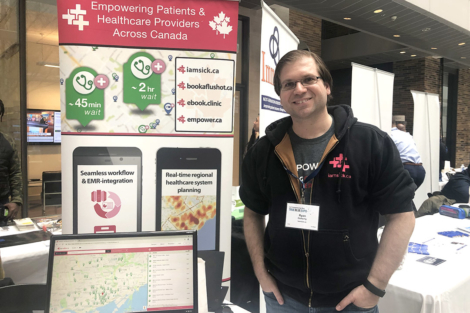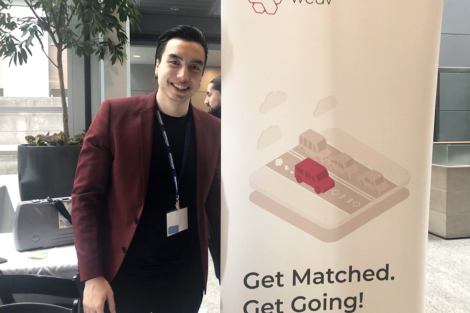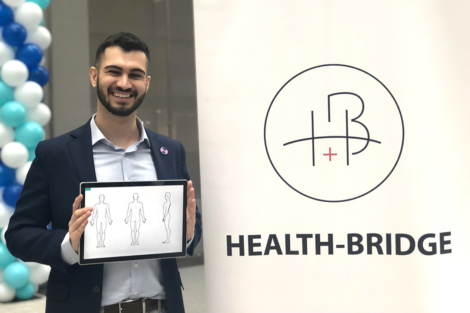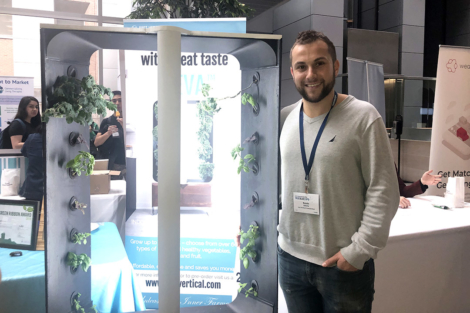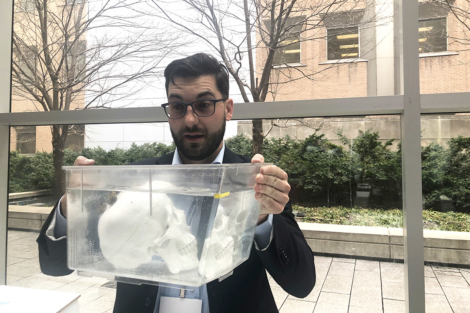On March 21, U of T held the True Blue Expo, the capstone event of Entrepreneurship Week. Hosted in the MaRS Discovery District, over 60 startups had the opportunity to showcase their work, while businesses and the public were given the opportunity to network with some great startups.
Empower Health
Ever gotten sick and found yourself in need of a walk-in appointment? Empower Health, formerly known as iamsick.ca, aims to reduce the hassle of phoning numerous clinics with inquiries for walk-in hours by aggregating a database. The app hosting the database will help patients see wait times for clinics, as waiting for an available slot at some clinics can take hours.
Founder Ryan Doherty said, “We now have enterprise clients, national coverage, government relationships, and a significant number of users and clinics using [the app].” The idea blossomed with the help of U of T’s Impact Centre, which “provided mentorship advice as well as office space to help iterate and test out the business model.”
Weav
Weav takes a new approach to ride-sharing applications by allowing users to open their car doors for carpooling with strangers. Founder Peter Meng said that since drivers are already travelling with “three empty seats” and spending money on gas, why not “open up your receipt and charge each passenger $10–20 to cover up the cost of the ride? This way, the driver can cover the costs, and the rider can travel affordably.”
Weav uses automated logistic payments and other systems to facilitate the carpooling process.
Health-Bridge
With a growing immigrant population within Toronto, some may find it difficult to communicate their symptoms to their doctors, which could lead to negative outcomes or inadequate health care provisioning. This is where Health-Bridge comes in. Its mission is to bridge the language barriers between health care professionals and their patients.
Despite numerous successes and accolades, especially for founder Haman Mamdouhi, who won the Young Entrepreneur Pitch Competition last summer and was subsequently selected for the prestigious NEXT Canada program as one of the top 36 entrepreneurs across Canada, the team is most proud of its start in the U of T entrepreneurship community. “We really learned first that we could be entrepreneurs here at [the] University of Toronto. Creating sustainable impact is more accessible than ever,” said Mamdouhi. With the support of U of T, the team has developed digital image-based methods in several languages to help patients describe their symptoms accurately.
One of Health-Bridge’s main values is impact. “The people who started this startup had family members who suffered from this exact problem,” said Mamdouhi. “Before we do anything, we make sure to eliminate that suffering.”
Just Vertical
As an urban dweller, it might seem like a struggle to get your hands on fresh, affordable, and pesticide-free produce year-round. Just Vertical helps address that problem by introducing the concept of indoor hydroponic farming.
Co-founder Kevin Jakiela said that Just Vertical’s value is in helping “people integrate growing plants in their homes and appreciate the global food supply chain.”
In the future, they plan to integrate hydroponic growing in other pieces of furniture, such as tabletops and even couches, as well as to develop an app that will let users — who may have not-so-green thumbs — know when to water their plants.
Cohesys
Craniomaxillofacial fracture surgeries — which relate to fractures around the face and head area — rely on plate and screw methods that tend to result in complications over 40 per cent of the time. Cohesys hopes to reduce complications, lessen surgery hours, and reduce operating room costs through an adhesive tape.
Founded by Michael Floros, Cohesys oversees the management of BoneTape, a “non-toxic and resorbable polymer with a biodegradable adhesive on it.” The resorbable aspect of the adhesive will reduce the amount of recurring future problems that patients may have with conventional titanium bone and screw methods, such as facial sensitivities.
Support from U of T incubators UTEST and the Creative Destruction Lab has helped Cohesys reach the product stage.


